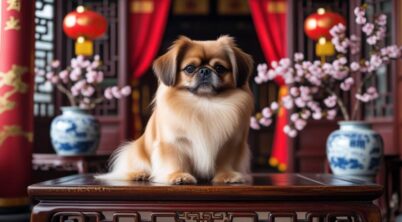The Pekingese is a breed steeped in rich history and distinctive personality traits. Originally bred as a companion dog for the Chinese imperial family, this toy breed carries itself with dignity and confidence, often garnering the title of ‘lion dog’ due to its noble demeanor and lush mane. Despite their small stature, Pekingese possess a self-assured presence and are known to display an independent spirit that reflects their royal ancestry.
Personality wise, the Pekingese is a complex, multifaceted character. Their independence doesn’t detract from their affectionate nature toward their families, often forming strong bonds with their owners. However, they can display a certain aloofness, particularly with strangers, further emphasizing their regal bearing. As small dogs, they can be surprisingly assertive, unafraid to make their presence known through their distinct bark which can be misleadingly robust for their size.
Though their luxurious coat accentuates their stately appearance, it also signifies a significant grooming commitment. This breed requires regular maintenance to keep their fur in good condition. The Pekingese is well-suited for a variety of living situations and can thrive in both apartments and homes with yards. Their less demanding exercise needs make them ideal for less active individuals or those with limited mobility. However, it’s important to remember that Pekingese do enjoy activities that stimulate both their body and mind, which keeps them well-rounded and content.
Table of Contents
Pekingese Personality
The Pekingese breed is known for a distinct set of personality traits, reflecting their storied history as favored companions in ancient Chinese courts. They often display a mix of dignity and confidence, which ties back to their ancestral roots as royal pets.
Self-esteem and Confidence:
- Self-assured: The Pekingese possesses a regal confidence, frequently exhibiting independence and self-importance.
- Courageous: Despite their small size, they can be surprisingly bold and brave.
Social Behavior:
- Aloof: With a natural dignity about them, they may seem reserved, particularly with strangers.
- Affectionate: Towards familiar faces, especially family members, they are known to show intense loyalty and affection.
Behavioral Characteristics:
- Watchful: These dogs are alert and can be counted on to bark to alert their owners of anything unusual.
- Playfulness: While dignified, they also have a playful side and enjoy bouts of play.
Temperament:
- Even-tempered: They typically maintain a balanced disposition.
- Sensitive: The breed is responsive to their owner’s emotions and environments.
Interactions:
- Protective: They can be protective of their owners and may be wary of other pets.
- Require attention: A Pekingese thrives on attention from its owners and can become unhappy without it.
Understanding these personality traits is important for potential owners, as it helps to ensure a harmonious match between the Pekingese and their human companions.
Temperament and Personality
Pekingese dogs exhibit a unique blend of affectionate loyalty and independent regality. Their temperament reflects centuries of companionship while maintaining a dignified and somewhat reserved demeanor.
Behavioral Traits
Regal Bearing: They carry themselves with a confident, noble grace, often described as lion-like due to their heritage as companions to Chinese royalty.
Independent Nature: While loving, Pekingese exhibit an independent streak that can sometimes manifest as stubbornness. They tend to approach life on their terms.
- Loyalty: They are deeply loyal to their family members, often forming strong, enduring bonds.
- Affection Levels: High levels of affection are common with this breed, showing a preference for close companionship and frequent interaction.
- Silent Watchers: Generally a quiet breed, Pekingese may not bark excessively, but will still be alert and watchful.
- Stubborn Tendencies: They can be resistant to commands or training that does not interest them, making consistent and patient training important.
Social Disposition
Social Interaction:
- With Family: Pekingese are affectionate and loving with their human families, often seeking out laps or a spot next to their favored person.
- With Strangers: They can be polite, yet reserved with strangers, taking time to warm up to new people.
Interaction with Other Pets:
- Canine Relationships: Interactions with other dogs can sometimes be strained, especially if they feel their territory is threatened.
- Behavior with Other Animals: A Pekingese’s response to other types of pets can vary; they may be friendly or indifferent, but this heavily depends on the individual’s temperament and socialization.
Training and Socialization
Training a Pekingese requires understanding their independent mindset. Employing positive reinforcement and establishing a consistent routine early on are crucial. Socialization plays a vital role in developing a well-rounded and adaptable Pekingese.
Training Techniques
When it comes to training a Pekingese, one should focus on positive reinforcement. This breed responds well to:
- Treats: Use these as a motivator to reward positive behavior.
- Crate Training: Effective for housebreaking, it provides a safe space for the dog.
- Patience: Their independent nature means training may take more time; patience is key.
Consistency with commands and expectations aids in creating a successful training environment. It’s not about dominance; it’s about clear, confident guidance.
The Importance of Early Socialization
Early socialization is critical in shaping the temperament of a Pekingese. They benefit from:
- Exposure to various people, environments, and other animals.
- Being introduced to new situations in a gradual and positive manner.
Socialization helps mitigate potential wariness or aloofness with strangers. A well-socialized Pekingese is more likely to exhibit confidence in unfamiliar settings and with new people.
Ownership Experience
The ownership experience of Pekingese can be quite unique, revolving around their history as royal companions and their distinctive personality traits. Owners should be prepared for a breed that demands engagement and provides an alert presence.
Engagement with the Breed
The Pekingese is known for its close bond with its human companions. They were historically the dogs of Chinese royalty, which has contributed to their self-assured and somewhat regal demeanor. They typically enjoy being the center of attention and can exhibit a somewhat protective nature. While small, Pekingese dogs are alert and can serve as effective watchdogs due to their vigilant and sometimes suspicious nature towards strangers.
A Pekingese owner should anticipate:
- Companionship: A strong desire for closeness and affection from their human.
- Watchdog Nature: An innate tendency to bark at unfamiliar sounds or intruders, asserting their role as small, yet assertive, watchdogs.
Support and Resources
The breed’s distinctive round face and luxurious coat require consistent grooming from the owner or a professional. Due to their physical structure, they may experience respiratory issues, so it is critical for owners to stay informed on health-related needs.
Available resources for a Pekingese owner include:
- Rescues and Shelters: Institutions that can provide breed-specific advice and support.
- Dog Owner Communities: Online forums and local clubs where experiences and tips are shared.
- Grooming Guides: Instructions and tutorials specific to maintaining the Pekingese’s coat.
Owners must commit time to grooming and health maintenance, ensuring their Pekingese retains the monkey-like facial expressions free from matting and discomfort.








